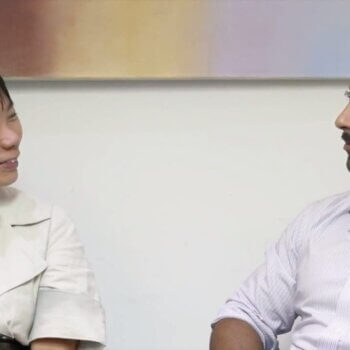ShuQi is a Gen-Y entrepreneur who recently started her own public relations company, Q Communications, in May 2014. Through quality execution, ShuQi is committed to helping newly formed businesses achieve open communications with various stakeholder groups. Besides building a young business, ShuQi enjoys yoga, music and reading in her free time.
In your own words what is Q Communications?
Q Communications is a Singapore-based branding and public relations agency. We are not the biggest in the industry, but we are a force to be reckoned with. It was founded when online and digital media began merging; more corporates were leaving their jobs to start their own business and employees in the creative industry were demanding more flexible working arrangements.
How did you come up with the idea of Q Communications?
I came up with the idea of Q Communications when PR agencies were struggling to sustain a stuffy corporate culture. Clients were also leaving their high-paying jobs to set up their own businesses. It was only a matter of time before the market required someone well versed in branding and PR principles to take up new jobs that required more flexibility and autonomy.
Could you walk us through the process of starting up Q Communications?
Starting up Q Communications was not easy, especially since I am young, Asian and female! Nevertheless, I persevered. Eventually, people gave me opportunities to help them meet their outreach objectives. Over time, I could build a good rapport with my clients. More importantly, the media also found it interesting that a PR start-up was representing clients in the start-up space. Now, I am glad to see my clients have a media presence.
How have you been developing Q Communications since startup?
Ever since Q Communications was founded in May 2014, it was clear that the company would set out to be a well-known brand, just as Ogilvy will always be synonymous with effective advertising. With this goal in mind, the challenge was to build up the client base and a capable team of creative communicators. To do this well, it was important to always stay focused on the big picture and be patient about gaining traction.
What kind of feedback did you get for Q Communications so far?
So far, the feedback for Q Communications has been great! Clients are very happy when their outreach objectives are met. The team also feels good about contributing towards the company growth.
Do you face a lot of competition in this industry ?
Q Communications is still operating as a small scale business, so thankfully we don’t face a lot of direct competition in the industry because not many agencies in Singapore are willing to offering marketing and PR support to newly formed businesses. In time to come, it is important that Q Communications differentiate itself from the competition by constantly evolving with the times and thinking a few steps ahead of what everyone else is doing. This ensures that we are a competent, trusted and reliable PR agency in the long run.
Have you developed any industry insights that you could share?
As PR professionals, we need to understand our clients’ business in order to engage the media. We must also simplify the messaging so reporters can cut thru the clutter and get to the crux of the clients’ standout points. More importantly, we must have the creativity and knowledge to leverage when the right opportunity comes along.
To do this, a lot of time and effort is spent on researching and listening to what others have to say. A good PR professional must always be open to new ideas and possibilities. This principle remains as the industry will always be changing with the times.
What is the future of the industry and how do you plan to stay relevant in this industry?
Like every other industry, work processes in marketing and PR will be automated by disruptive technologies. To stay relevant, it is always important to collaborate with like-minded individuals and be part of the ecosystem. For example, researching for the right media contacts used to be a tedious process. This involves buying the publication and manually flipping through it to find the suitable section and reporter. Today, there are companies which share these media contacts through a subscribed database. With the internet, we can also readily access the publication online. Another example would be working with strategic partners who complement your skillsets. At Q Communications, our strengths lie in media relations and copywriting. As such, we make an extra effort to work with graphic designers to bring out the visual aspects of the brand. This way, clients can better reach their outreach objectives through a collective effort.
Were there anything that disappointed you initially?
It is always disappointing when people perceive Q Communications as young and inexperienced, and try to take advantage of our expertise to reach their own goals. As such, Q Communications is very selective about working with the right partners. We are always open to trying out the working relationship first with anyone who is happy to give us the opportunity. However, in the long run, we want to achieve a win-win situation and not subject ourselves to anything lesser than our partners.
What do you think about being an entrepreneur in Asia?
Being an entrepreneur in Asia is very exciting. I think it is easier than our counterparts in other parts of the world. Asia is rising, and that means business opportunities are plenty. As long as you are willing to take risks and try new things, being an entrepreneur in Asia will be a very rewarding experience in time to come.
What is your opinion on Asian entrepreneurship vs Western entrepreneurship?
I would like to think that the principles in entrepreneurship, such as working hard, capitalizing on new opportunities, transforming a vision into a reality, taking that elusive leap of faith and such, is constant in both contexts. What differs in Asian and Western entrepreneurship lies in geography and culture. Asia, like the West, has its own unique characteristics. It takes time and effort to understand the differences and fully embrace the challenges in these regions.
What is your definition of success?
At a professional level, success is when Q Communications becomes a well-known PR agency in the industry. Clients are very happy with the work we do, the media loves to engage with our clients, we get new business through client referrals and word-of-mouth. More importantly, people value the work executed by a sensible, logical team of creative communicators. I don’t have to be driving the business on a daily basis at all, the team is competent and motivated enough to do the best they can.
On a personal level, success is doing what I’m good at and enjoying it to the fullest. It is always rewarding to see clients establish a public voice so more people can get to know the great work they do.
Why did you decide to become an entrepreneur?
Honestly, I never thought I would become an entrepreneur. I joined the industry thinking I would do my best to climb up the corporate ladder. Over time, I came to realise that my career ambitions were better fulfilled if I started something I really believed in. Which seems to be working out pretty well thus far!
In your opinion, what are the keys to entrepreneurial success?
Entrepreneurial success comes with tenacity. Go after what gives you goose bumps!
Any parting words of wisdom for entrepreneurs out there from your personal experience?
Being a young entrepreneur is not as glamourous as it sounds. It actually requires a huge sacrifice to build a business. If you are willing to make major lifestyle adjustments and bid goodbye to your social life, entrepreneurship can be very rewarding in the long run.
Connect
LinkedIn: https://sg.linkedin.com/in/sliu51
Twitter: https://twitter.com/SGQComms





























